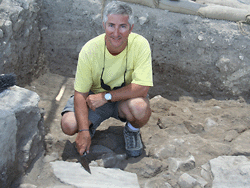Abstract
 For more than three hundred years during the Late Bronze Age, from about 1500 BC to 1200 BC, the Mediterranean region played host to a complex international world in which Egyptians, Mycenaeans, Minoans, Hittites, Assyrians, Babylonians, Cypriots, and Canaanites all interacted, creating a cosmopolitan and globalized world-system such as has only rarely been seen in human history.
For more than three hundred years during the Late Bronze Age, from about 1500 BC to 1200 BC, the Mediterranean region played host to a complex international world in which Egyptians, Mycenaeans, Minoans, Hittites, Assyrians, Babylonians, Cypriots, and Canaanites all interacted, creating a cosmopolitan and globalized world-system such as has only rarely been seen in human history.
It may have been this very internationalism that contributed to the apocalyptic disaster that ended the Bronze Age. When the end came, after centuries of cultural and technological evolution, the civilized, international world of the Mediterranean regions in a vast area stretching from Greece and Italy in the west to Egypt, Canaan, and Mesopotamia in the east, came to a dramatic halt. Small kingdoms and large empires alike, that had taken centuries to evolve, collapsed rapidly, and with their end came the first recorded Dark Ages. It was not until centuries later that a new cultural renaissance emerged in Greece and other affected areas, setting the stage for the evolution of Western society as we know it today.
Blame for the end of the Late Bronze Age is usually laid squarely at the feet of the so-called Sea Peoples, known to us from the records of the Egyptian pharaohs Merneptah and Ramses III. However, as was the case with the fall of the Roman Empire, the end of the Bronze Age empires in this region was not the result of a single invasion, but of multiple causes. The Sea Peoples may well have been responsible for some of the destruction that occurred at the end of the Late Bronze Age, but it is much more likely that a concatenation of events, both human and natural — including earthquakes, storms, droughts, rebellions, and systems collapse — coalesced to create a “perfect storm” that brought the age to an end.
Speaker
 Eric H. Cline is Professor of Classics and Anthropology and Director of the Capitol Archaeological Institute at The George Washington University. He is an active field archeologist and currently serves as Co-Director of excavations at Tel Kabri in Israel. Previously he served as Chair of the Department of Classical and Near Eastern Languages and Civilizations at GW and as Co-Director of excavation at Megiddo (biblical Armageddon) also in Israel.
Eric H. Cline is Professor of Classics and Anthropology and Director of the Capitol Archaeological Institute at The George Washington University. He is an active field archeologist and currently serves as Co-Director of excavations at Tel Kabri in Israel. Previously he served as Chair of the Department of Classical and Near Eastern Languages and Civilizations at GW and as Co-Director of excavation at Megiddo (biblical Armageddon) also in Israel.
He earned an AB in Classical Archaeology with Anthropology at Dartmouth, an MA at Yale in Near Eastern Languages and Literature, and a PhD in Ancient History at the University of Pennsylvania. And he has more than 30 seasons of excavation and survey experience at archeological sites in Israel, Egypt, Jordan, Cyprus, Greece, Crete, and the United States.
He is an author on nearly 100 academic articles and 16 scholarly and popular books, including The Battles of Armageddon: Megiddo and the Jezreel Valley from the Bronze Age to the Nuclear Age; Jerusalem Besieged: From Ancient Canaan to Modern Israel; From Eden to Exile: Unraveling Mysteries of the Bible; Biblical Archaeology: A Very Short Introduction; The Trojan War: A Very Short Introduction, and 1177 BC: The Year Civilization Collapsed.
Among many honors, Eric has been awarded the Biblical Archaeology Society’s “Best Popular Book on Archaeology” Award three times, the American Schools of Oriental Research’s “Best Popular Book” Award, the Trachtenberg Prize for Teaching Excellence and the Trachtenberg Prize for Faculty Scholarship – the two highest teaching awards at GWU, and he is the first faculty member to have won both Trachtenberg awards.
He speaks widely and has given more than 300 scholarly and public lectures and presentations and he has appeared in more than twenty television programs and documentaries.
















